- Home
- Patrick O'Brian
Blue at the Mizzen
Blue at the Mizzen Read online
BLUE AT THE MIZZEN
Patrick O'Brian is the author of the acclaimed Aubrey-Maturin tales and the biographer of Joseph Banks and Picasso. His first novel, Testimonies, and his Collected Short Stories have recently been reprinted by HarperCollins. He translated many works from French into English, among the novels and memoirs of Simone de Beauvoir and the first volume of Jean Lacouture's biography of Charles de Gaulle. In 1995 he was the first recipient of the Heywood Hill Prize for a lifetime's contribution to literature. In the same year he was awarded the CBE. In 1997 he was awarded an honurary doctorate of letters by Trinity College, Dublin. He died in January 2000 at the age of 85.
The Works of Patrick O'Brian
The Aubrey/Maturin Novels
in order of publication
MASTER AND COMMANDER
POST CAPTAIN
HMS SURPRISE
THE MAURITIUS COMMAND
DESOLATION ISLAND
THE FORTUNE OF WAR
THE SURGEON'S MATE
THE IONIAN MISSION
TREASON'S HARBOUR
THE FAR SIDE OF THE WORLD
THE REVERSE OF THE MEDAL
THE LETTER OF MARQUE
THE THIRTEEN-GUN SALUTE
THE NUTMEG OF CONSOLATION
CLARISSA OAKES
THE WINE-DARK SEA
THE COMMODORE
THE YELLOW ADMIRAL
THE HUNDRED DAYS
BLUE AT THE MIZZEN
Novels
TESTIMONIES
THE CATALANS
THE GOLDEN OCEAN
THE UNKNOWN SHORE
RICHARD TEMPLE
CAESAR
HUSSEIN
Tales
THE LAST POOL
THE WALKER
LYING IN THE SUN
THE CHIAN WINE
COLLECTED SHORT STORIES
Biography
PICASSO
JOSEPH BANKS
Anthology
A BOOK OF VOYAGES
HarperCollinsPublishers
77-85 Fulham Palace Road,
Hammersmith, London W6 8JB
www.HarperCollins.co.uk
This paperback edition 2003
Previously published in B-format paperback
by HarperCollins 2000
First published in Great Britain by
HarperCollinsPublishers 1999
Copyright © The estate of the late Patrick O'Brian CBE 1999
Patrick O'Brian asserts the moral right to
be identified as the author of this work
ISBN 978-0-00-651378-0
Set in Imprint by
Rowland Phototypesetting Ltd.
Bury St. Edmunds, Suffolk
Printed and bound in Great Britain by
Clays Ltd, St. Ives plc
All rights reserved. no part of this publication may be reproduced, stored in a retrieval system, or transmitted, in any form or by any means, electronic, mechanical, photocopying, recording or otherwise, without the prior permission of the publishers.
This book is sold subject to the condition that it shall not, by way of trade or otherwise, be lent, re-sold, hired out or otherwise circulated without the publisher's prior consent in any form or binding or cover other than that in which it is published and without a similar condition including this condition being imposed on the subsequent purchaser.
I dedicate this book, donum indignum,
to the Provost and to all those many people
who were so kind to me while I was
writing it in Trinity College, Dublin
Chapter One
The Surprise, lying well out in the channel with Gibraltar half a mile away on her starboard quarter, lying at a single anchor with her head to the freshening north-west breeze, piped all hands at four bells in the afternoon watch; and at the cheerful sound her tender Ringle, detached once more on a private errand by Lord Keith, cheered with the utmost good will, while the Surprises turned out with a wonderful readiness, laughing, beaming and thumping one another on the back in spite of a strong promise of rain and a heavy sea running already. Many had put on their best clothes—embroidered waistcoats, and silk Barcelona handkerchiefs around their necks—for the Surprises and their captain, Jack Aubrey, had taken a very elegant prize indeed, a Moorish galley laden with gold, no less—a galley that had fired on Surprise first, thus qualifying herself as a pirate, so that the prize-court, sitting at the pressing request of Captain Aubrey's friend Admiral Lord Keith, had condemned her out of hand: a perfectly lawful prize, to be shared according to the usage of the sea, or more exactly according to the Prize Law of 1808.
And now they were all on deck, radiating joy and facing aft on the larboard side of the quarterdeck in the usual disorderly naval heap, gazing at their captain, his officers, the purser and the clerk, ranged athwartships and facing forward on either side of some charming barrels. These had been brought aboard by a guard of Marines, heavily sealed: but now their heads had been taken off (though carefully numbered and preserved by the cooper) and it was apparent that their bodies were filled with coin. The gold was somewhat unorthodox, it having been captured in small uneven ingots which the Gibraltar goldsmiths had cast into smooth shining disks each marked 130g Troy: one hundred and thirty grains Troy weight: but the silver and copper were in their usual homely forms.
The echo of the fourth bell and the cheering died: the clerk, catching his captain's nod, called 'John Anderson'. Since no one else aboard Surprise in this commission had ever come earlier in the alphabet it was no surprise to John Anderson or his shipmates; and although he was ordinarily shy and awkward he now stepped aft quite happily to the capstan-head: taking off his hat, he touched his forelock and cried, 'John Anderson, sir, if you please: ordinary, larboard watch, afterguard.' The clerk followed this conscientiously in the book though he knew it all by heart; said, 'Very well: one hundred and fifty-seventh part of a half-share: hold out your hat.' And plunging his right hand into the barrel of gold he drew out first one handful of disks and counted them into the hat, 'One, two . . . ten.' Plunged again, counted out seven more, said 'Wait a minute' to Anderson and to his little dark shrewish assistant at the other two barrels, 'Seventeen and fourpence.' Then to Anderson again, 'That makes seventeen pound, seventeen shillings and fourpence: and here is your witnessed paper asking for three hundred and sixty-five pound to be remitted to Mrs Anderson. Are you content?'
'Oh dearie me, yes,' said Anderson, laughing. 'Oh yes, sir, quite content.'
'Then sign here,' said the clerk: but seeing Anderson's uneasy look, he murmured, 'Well, just make your mark in the bottom corner.'
And so it went, right through the list: there were a few men with no dependants of any kind, and they walked off with the entire hundred and fifty-seventh part of half the splendid prize; but most over thirty had yielded to the representations of their captain and divisional officers to send at least some money home; and all eagerly agreed with the clerk's reckoning. At one time Stephen Maturin, the frigate's surgeon, had been calculating the degree of literacy aboard; but melancholy, no doubt helped by the increasing wind and the spindrift, had welled up and he lost count among the names beginning with N. 'How I do wish,' he murmured to Jack in a moment's pause, 'that William and his Ringles might have been here.'
'So do I indeed: but, you know, as a privately-owned tender to what is in fact a hydrographical vessel I do not think they would stand in line for more than fourpence. In any case I could not refuse Lord Keith—he had no other suitable craft at hand—he asked it as a personal favour. And I owe him a great deal: I owe both of them a great deal.'
'Of course, of course: it was only that I should have liked some of the younger ones to accept a gold piece, by way of memento,' said
Stephen. 'How the waves increase! The darkness thickens.'
'They will rejoin at Madeira,' said Jack. 'And then you can give them their gold pieces.' They talked on quietly until Jack realized that Willis and Younghusband had been dealt with, and that once Moses Zachary, one of Surprise's very old Sethian hands, had stopped chuckling over the coins that he obscurely insisted upon stuffing or trying to stuff into a variety of little inadequate triangular pockets it would be time for him as captain to wind up proceedings.
But the proceedings would not be wound up: in spite of the gathering darkness and the now quite vicious driving rain some hand, probably Giles, captain of the foretop, called out 'It's all along of the unicorn's horn—it's all along of the glorious hand. Huzzay, three times huzzay for the Doctor.'
Lord, how they cheered their surgeon! It was he who had brought the narwhal's tusk aboard: and the severed hand, the Hand of Glory, was his property: both symbolized (and practically guaranteed) immense good fortune, virility, safety from poison or any disease you chose to name: and both had proved their worth.
Jack Aubrey was a taut captain: he had been brought up by commanders who looked upon exact discipline and exact gunfire as of equal importance in a man-of-war, but on this occasion he knew that he had nothing whatsoever to say; and speaking privately to his first lieutenant he observed, 'Mr Harding, when things are a little calmer, let us weigh and proceed south-west by west with all the sail she can bear. If any King's ship hails or signals you will reply carrying dispatches and pursue your course, touching neither sheet nor brace.'
'South-west by west it is, sir: and carrying dispatches,' said Harding, and Jack, steadying Stephen by the elbow—the frigate was pitching quite violently by now—guided him to the great cabin, where they sat at their ease on the cushioned stern-lockers that ran across the ship under the elegant, remarkably elegant sash-lights that gave on to the sea.
'I am afraid it is going to turn out a truly dirty night,' said Jack. He stood up and in his sure-footed seaman's way walked over to his barometer. 'Yes,' he said. 'Dirtier than I had thought.' He came back and gazed out at the darkness, full of rain and flying water from the ship's bow-wave, more and more as she increased her way. 'But, however,' he went on, 'I am most heartily glad to be at sea. At one time I thought it could never be done . . . indeed, without Queenie and Lord Keith it never would have been done.' The stern-lanterns were now lighting up the frigate's wake—exceptionally broad, white and agitated for a ship with such fine lines—but in spite of the brilliance just aft he could still clearly make out the distant red glow above Gibraltar, where they were still keeping it up in spite of the wind and the rain.
For his own part he had had quite enough of the junketing, especially that part of it which consisted of patriotic songs, self-praise and mocking the French, who had after all gone down fighting, outnumbered, with the utmost gallantry—gibes that very often came from those who had had nothing whatsoever to do with the war. Even Maturin, though he loathed the whole Napoleonic system root and branch, could not bear the obscene, gloating caricatures of Bonaparte that were everywhere to be seen, a penny plain and up to as much as fourpence coloured.
'Do you remember Malta, when there was a payment of six dollars a head for one-share men?' asked Jack. 'No, of course you do not: you were at the hospital, looking after poor Hopkins's leg. Well, I thought it would answer, with a settled, steady crew of seamen: and they certainly expected it, the bag of silver having been hauled out of the trabacolo's cabin and spilt on deck. But I was wrong: once ashore they kicked up Bob's a-dying to a most shocking extent and then set about the soldiery.'
'Indeed I remember it. My colleagues and I had to treat many of them: contusions, mostly, and some quite important fractures.'
'So you did . . .' said Jack, shaking his head: then he stopped, listened intently, and ran on deck. Coming back, he wiped the foam and rain from his face with an habitual gesture and said, 'Fore topmast staysail carried away—a damned awkward veering wind and as black as the Devil's arse. But young Wilcox was up there before I reached the fo'c'sle and they were tallying the new sheet aft as though it were broad daylight and the sea as smooth as a pond. But there you are: that is your seaman. He can put up with uncommon dirty weather, endure great hardship and very short commons—a good, steady, courageous, uncomplaining creature under officers he can respect. He will bear all that, and sometimes harsh punishment, shipwreck and scurvy. What he cannot bear is sudden wealth. It goes straight to their heads, and if there is the least possibility they get drunk and disorderly, and desert in droves. In Malta it was not so bad. With the help of the whores their six dollars were soon spent; and on an island there was no chance of deserting. But now the case is altered, and each damn-fool hand with fifty guineas in his pocket would have been blind drunk, poxed and stripped before Sunday, had we not got away: besides—what is it, Killick?'
'Which we shall have to ship washboards athwart the coach door: green seas is coming aft as far as the capstan, and getting worse every minute. I doubt we'll ever get your toasted cheese up dry, without I bring up the spirit-stove and do it here.'
'Who has the deck at the moment?'
'Why, the Master, sir, in course: and he's just sent Mr Daniel and a couple of strong hands aloft with a spare lantern. Which the top-light came adrift again. And sir—' addressing Stephen—'your mate—I beg his pardon: Dr Jacob as I ought to say—has had a nasty tumble. Blood all over the gun-room.'
Stephen tried to leap to his feet, but the roll of the ship pressed him back: and when he made a second attempt on the larboard heave it flung him forward with shocking force. Both the captain and the captain's steward had the same notion of Stephen's seamanship, however: between them they held him steady, and Jack, grasping his windward elbow, guided him through the coach—the anteroom, as it were, to the great cabin—and so out on to the deck, where the blast, the utter darkness, thick with racing spindrift, rain, and even solid bodies of sea-water, took his breath away, used though he was to the extremities of weather.
'Mr Woodbine,' called Jack.
'Sir,' replied the Master, just beside the wheel, where the faint glow of the binnacle could be made out by eyes growing accustomed to the darkness.
'How is the top-light coming along?'
'I am afraid we shall have to rouse out the armourer, sir: I doubt Mr Daniel can fix the bracket without heavy tools.' Then raising his voice he called to the quartermaster stationed to windward, watching the weather-leeches. 'Higgs, hail the top and ask if Mr Daniel would like the armourer.'
Higgs had an enormous voice and very keen ears: through all the shrieking of the wind in the rigging and its roaring changes he conveyed and received the message. By this time Stephen could make out the small hand-lantern high among the pattern of sails, all as close-hauled as ever they could be, with the frigate plunging westward through the tumultuous seas. He could also see the faint light reflected from the companion-ladder; and towards this he crept, holding on to everything that offered, bowed against the wind and the blinding rain. But with each tentative step he took down, the frantic uneven roll grew less—a question, as Jack had often told him, of the centre of gravity. Yet a most discreditable scene it was when he opened the larboard door of the bright-lit gun-room. Here were men, accustomed to bloodshed from their childhood, now running about like a parcel of hens, mopping Jacob's arm with their napkins, giving advice, proffering glasses of water, wine, brandy, loosening his neckcloth, undoing his breeches at the waist and the knee. The purser was literally wringing his hands.
'Pass the word for Poll Skeeping,' cried Stephen in a harsh peremptory tone. He thrust them aside irrespective of rank, whipped out a lancet (always in a side-pocket), slit Jacob's sleeve up to the shoulder, cut the shirt away, uncovered the spurting brachial artery and two other ample sources of blood on the same limb. In turning a complete somersault over both his chair and a small stool with a glass in his hand, at the moment of a double rise on the part of the frigate follo
wed by a sickening plunge, Jacob had contrived not only to stun himself but also to shatter the glass, whose broad, sharp-edged sides had severed the artery and many other smaller but still considerable vessels.
Poll came at a run, carrying bandages, gut-threaded needles, pledgets and splints. Stephen, who had his thumb on the most important pressure-point, desired the members of the gun-room to stand back, right back; and Poll instantly set about swabbing, dressing and even tidying the patient before he was carried off to a sick-berth cot.
All this had called for a good deal of explanation and comment: and when Jack came below, telling Mr Harding that they were making truly remarkable way, barely six points off the wind, the whole tedious thing seemed to be happening again, with people showing just what had happened and how it had happened, when a truly enormous, an utterly shocking crash checked the frigate's way entirely, thrusting her off her course and swinging the lanterns so violently against the deck overhead that two went out—a crash that drove all discussion of Jacob's injuries far, far from the collective mind. Jack shot up on deck, followed by the whole gun-room.
He could at first see nothing in the roaring darkness: but Whewell, the officer of the watch, told him that the forward starboard lookout had hailed 'Light on the starboard bow' seconds before the enormous impact; that he himself had seen a huge, dark, and otherwise lightless craft coming right before the wind at ten knots or more, strike the frigate's bows, cross her shattered stem and run down her larboard side, her yards sweeping Surprise's shrouds but always breaking free. A very heavy Scandinavian timber-carrier, he thought: ship-rigged. Could see no name, no port, no flag. No hail came across. He had roused out the bosun and the carpenter—they would report in a moment—the ship was steering still, though she sagged to leeward.

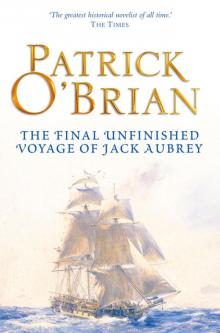 The Final Unfinished Voyage of Jack Aubrey
The Final Unfinished Voyage of Jack Aubrey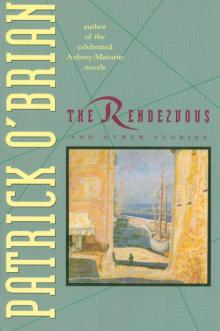 The Rendezvous and Other Stories
The Rendezvous and Other Stories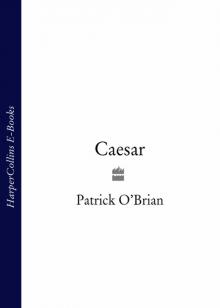 Caesar: The Life Story of a Panda-Leopard
Caesar: The Life Story of a Panda-Leopard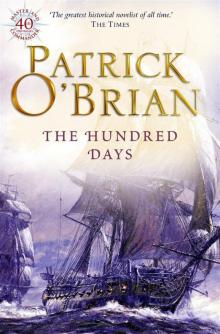 The Hundred Days
The Hundred Days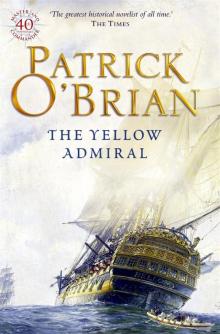 The Yellow Admiral
The Yellow Admiral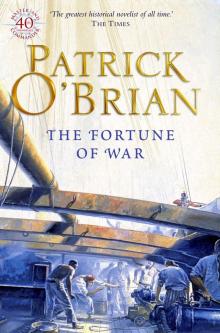 The Fortune of War
The Fortune of War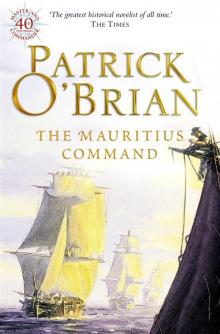 The Mauritius Command
The Mauritius Command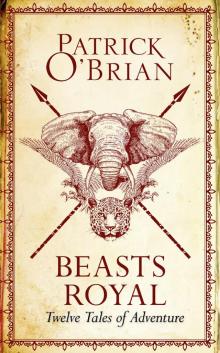 Beasts Royal: Twelve Tales of Adventure
Beasts Royal: Twelve Tales of Adventure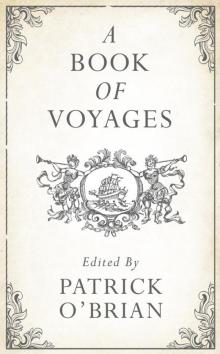 A Book of Voyages
A Book of Voyages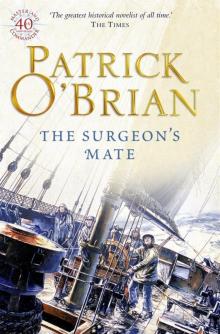 The Surgeon's Mate
The Surgeon's Mate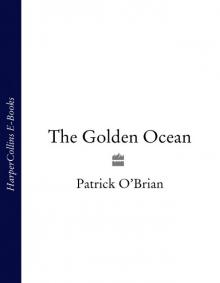 The Golden Ocean
The Golden Ocean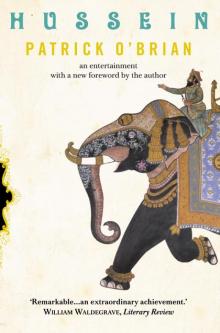 Hussein: An Entertainment
Hussein: An Entertainment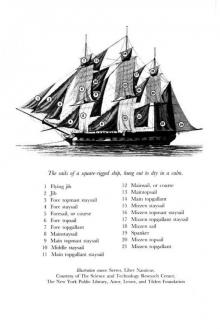 H.M.S. Surprise
H.M.S. Surprise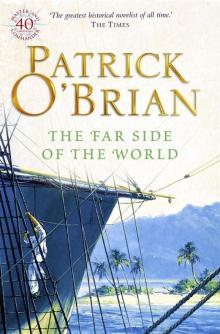 The Far Side of the World
The Far Side of the World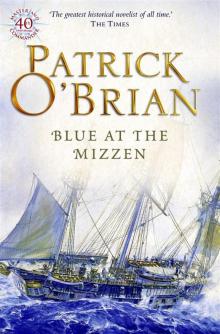 Blue at the Mizzen
Blue at the Mizzen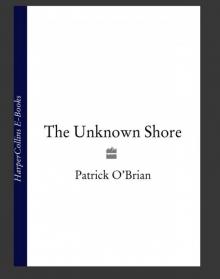 The Unknown Shore
The Unknown Shore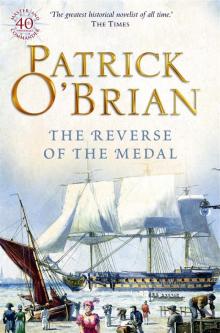 The Reverse of the Medal
The Reverse of the Medal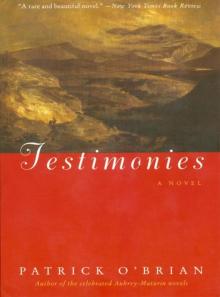 Testimonies
Testimonies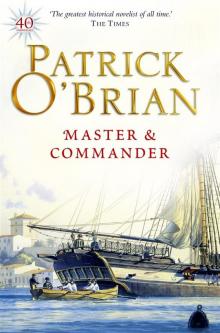 Master and Commander
Master and Commander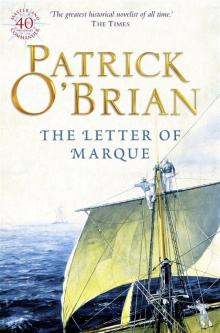 The Letter of Marque
The Letter of Marque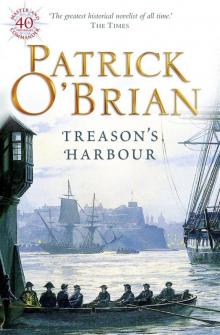 Treason's Harbour
Treason's Harbour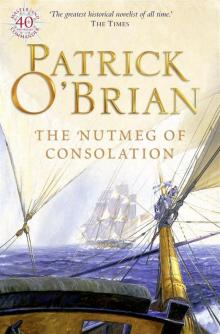 The Nutmeg of Consolation
The Nutmeg of Consolation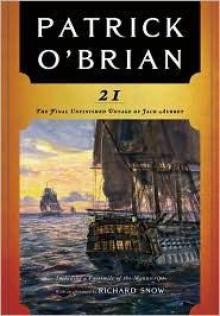 21: The Final Unfinished Voyage of Jack Aubrey
21: The Final Unfinished Voyage of Jack Aubrey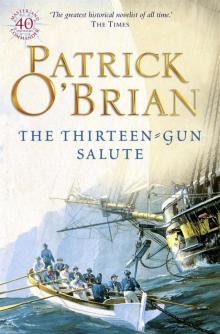 The Thirteen-Gun Salute
The Thirteen-Gun Salute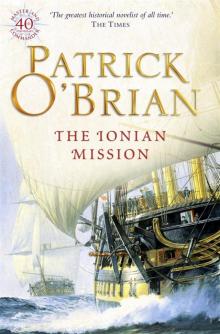 The Ionian Mission
The Ionian Mission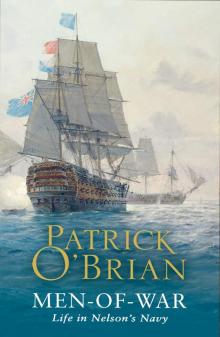 Men-of-War
Men-of-War The Commodore
The Commodore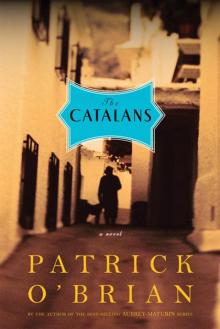 The Catalans
The Catalans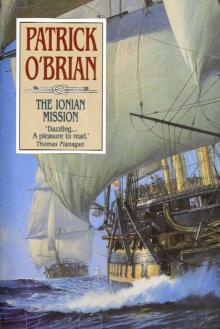 Aub-Mat 08 - The Ionian Mission
Aub-Mat 08 - The Ionian Mission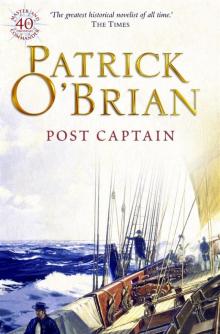 Post Captain
Post Captain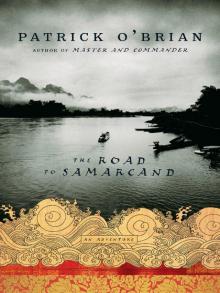 The Road to Samarcand
The Road to Samarcand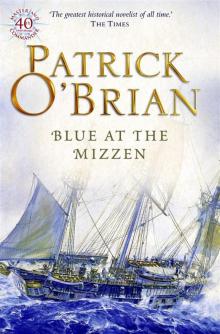 Book 20 - Blue At The Mizzen
Book 20 - Blue At The Mizzen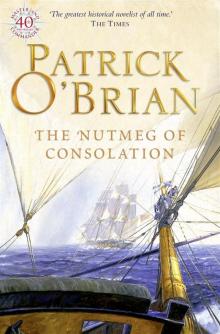 Book 14 - The Nutmeg Of Consolation
Book 14 - The Nutmeg Of Consolation Caesar
Caesar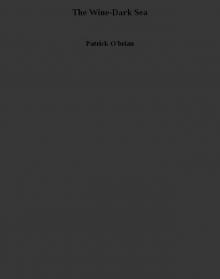 The Wine-Dark Sea
The Wine-Dark Sea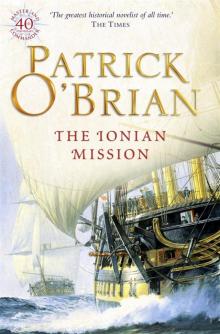 Book 8 - The Ionian Mission
Book 8 - The Ionian Mission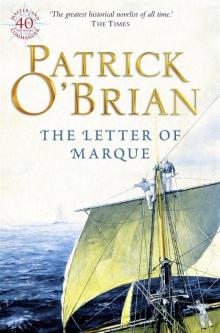 Book 12 - The Letter of Marque
Book 12 - The Letter of Marque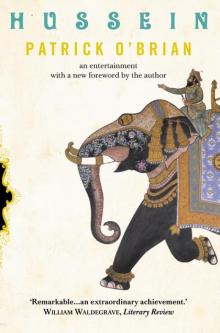 Hussein
Hussein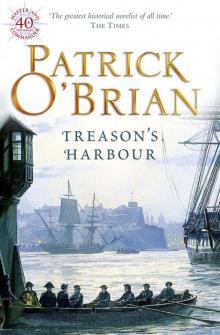 Book 9 - Treason's Harbour
Book 9 - Treason's Harbour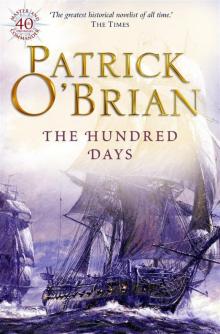 Book 19 - The Hundred Days
Book 19 - The Hundred Days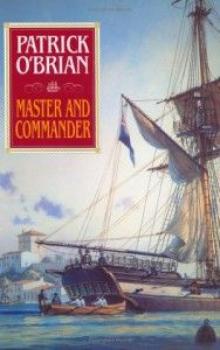 Master & Commander a-1
Master & Commander a-1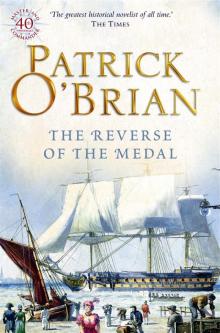 Book 11 - The Reverse Of The Medal
Book 11 - The Reverse Of The Medal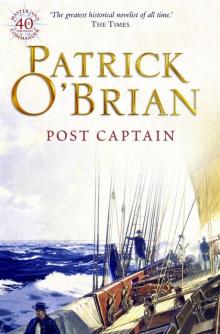 Book 2 - Post Captain
Book 2 - Post Captain The Truelove
The Truelove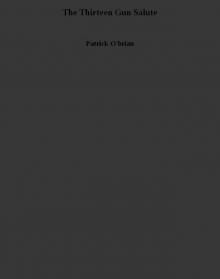 The Thirteen Gun Salute
The Thirteen Gun Salute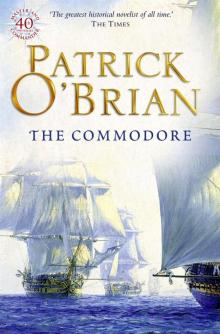 Book 17 - The Commodore
Book 17 - The Commodore The Final, Unfinished Voyage of Jack Aubrey
The Final, Unfinished Voyage of Jack Aubrey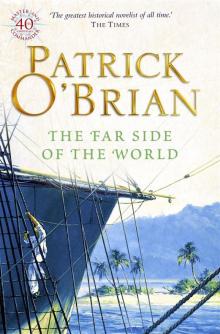 Book 10 - The Far Side Of The World
Book 10 - The Far Side Of The World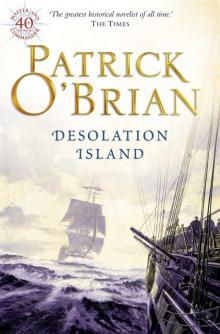 Book 5 - Desolation Island
Book 5 - Desolation Island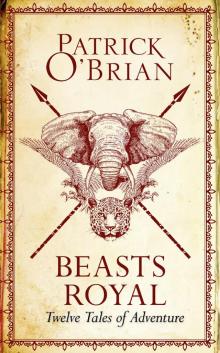 Beasts Royal
Beasts Royal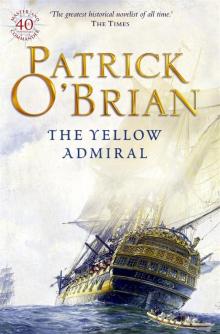 Book 18 - The Yellow Admiral
Book 18 - The Yellow Admiral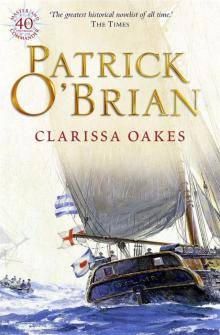 Book 15 - Clarissa Oakes
Book 15 - Clarissa Oakes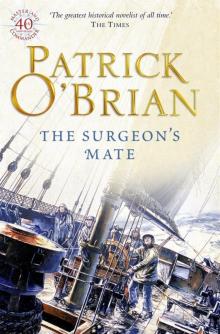 Book 7 - The Surgeon's Mate
Book 7 - The Surgeon's Mate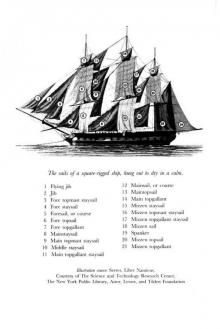 Book 3 - H.M.S. Surprise
Book 3 - H.M.S. Surprise Desolation island
Desolation island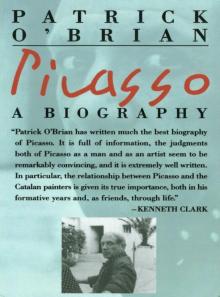 Picasso: A Biography
Picasso: A Biography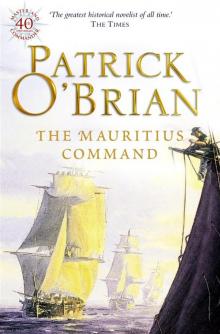 Book 4 - The Mauritius Command
Book 4 - The Mauritius Command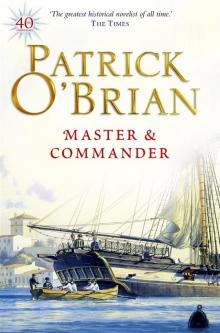 Book 1 - Master & Commander
Book 1 - Master & Commander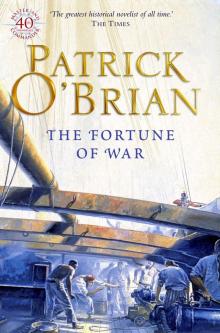 Book 6 - The Fortune Of War
Book 6 - The Fortune Of War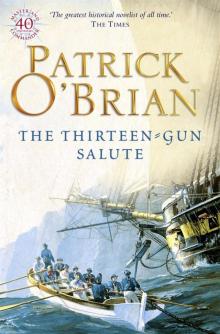 Book 13 - The Thirteen-Gun Salute
Book 13 - The Thirteen-Gun Salute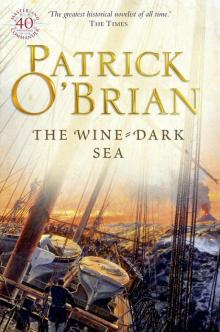 Book 16 - The Wine-Dark Sea
Book 16 - The Wine-Dark Sea